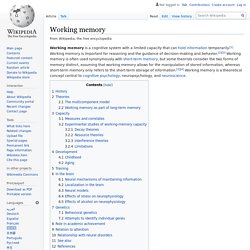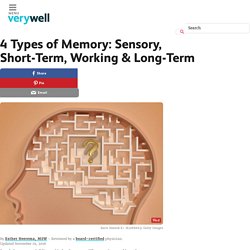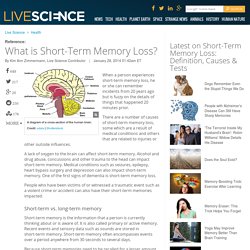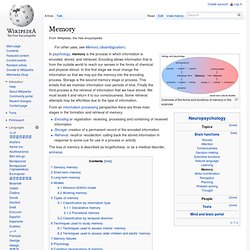

Memory. Ways to help remember certain information. Information processing. Long term memory. Short term memory. Sensory memory. Sensory Memory: Definition, Examples & Types. Working memory - Wikipedia. Cognitive system for temporarily holding information Working memory is a cognitive system with a limited capacity that can hold information temporarily.[1] Working memory is important for reasoning and the guidance of decision-making and behavior.[2][3] Working memory is often used synonymously with short-term memory, but some theorists consider the two forms of memory distinct, assuming that working memory allows for the manipulation of stored information, whereas short-term memory only refers to the short-term storage of information.[2][4] Working memory is a theoretical concept central to cognitive psychology, neuropsychology, and neuroscience.

History[edit] The term "working memory" was coined by Miller, Galanter, and Pribram,[5][6] and was used in the 1960s in the context of theories that likened the mind to a computer. In 1968, Atkinson and Shiffrin[7] used the term to describe their "short-term store". Theories[edit] Memory Types: Sensory, Short-Term, Working & Long-Term. People have several different kinds of memory.

What are they, and how does Alzheimer's disease impact them? Sensory Memory Sensory Memory is a very brief (about three seconds) recall of a sensory experience, such as what we just saw or heard. Short-Term Memory. Long-Term Memory definition. Long-Term Memory. "Long Term Memory" Clip - Inside Out. What Is Short-Term Memory? Short-term memory, also known as primary or active memory, is the information we are currently aware of or thinking about.

The information found in short term memory comes from paying attention to sensory memories. A quick overview: Short-term memory is very brief. Short-Term Memory Loss: Definition, Causes & Tests. When a person experiences short-term memory loss, he or she can remember incidents from 20 years ago but is fuzzy on the details of things that happened 20 minutes prior.

There are a number of causes of short-term memory loss, some which are a result of medical conditions and others that are related to injuries or other outside influences. A lack of oxygen to the brain can affect short-term memory. Memory. Overview of the forms and functions of memory in the sciences In psychology, memory is the process in which information is encoded, stored, and retrieved.

Encoding allows information that is from the outside world to reach our senses in the forms of chemical and physical stimuli. In this first stage we must change the information so that we may put the memory into the encoding process. Storage is the second memory stage or process.